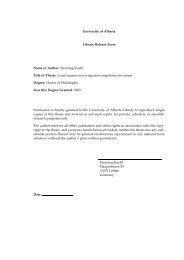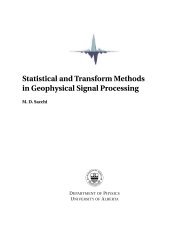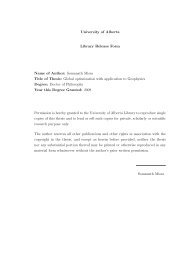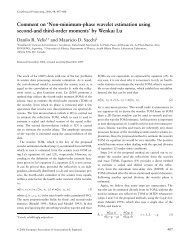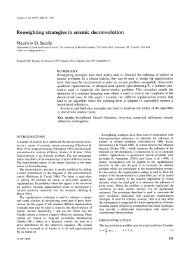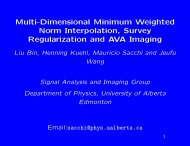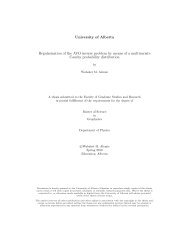Soner Bekleric Title of Thesis: Nonlinear Prediction via Volterra Ser
Soner Bekleric Title of Thesis: Nonlinear Prediction via Volterra Ser
Soner Bekleric Title of Thesis: Nonlinear Prediction via Volterra Ser
You also want an ePaper? Increase the reach of your titles
YUMPU automatically turns print PDFs into web optimized ePapers that Google loves.
Chapter 6<br />
Conclusions and Future Directions<br />
This thesis presented a method <strong>of</strong> signal modeling based on <strong>Volterra</strong> series. Specif-<br />
ically, I have developed an autoregressive method based on a nonlinear prediction<br />
algorithm. The prediction coefficients <strong>of</strong> the first-, second-, and third-order <strong>Volterra</strong><br />
model are obtained with a least squares solution. I also bring a new approach to<br />
solving two fundamental problems in seismic exploration: modeling <strong>of</strong> complex<br />
waveforms in the f − x domain and adaptive subtraction <strong>of</strong> multiples.<br />
Primary issues and available methods in modeling time series are examined<br />
in Chapters 1 and 2. First, the nonlinear system is introduced as a higher-order<br />
extension <strong>of</strong> the usual linear convolution method. Former linear prediction methods<br />
are also investigated to obtain prediction coefficients. Comparisons between a first-<br />
order <strong>Volterra</strong> series and Yule-Walker equations and Burg’s algorithm have shown<br />
that linear prediction methods model the data quite similarly. On the contrary,<br />
all linear methods can not properly model complex data sets (waveforms) unless a<br />
large number <strong>of</strong> coefficients is used.<br />
In Chapter 3 a <strong>Volterra</strong> series and its properties are analyzed. The <strong>Volterra</strong><br />
91



